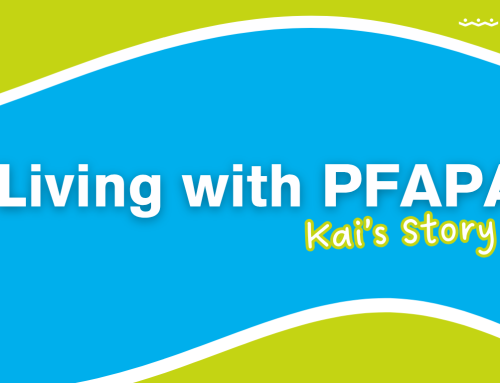Paige’s Journey with Juvenile Idiopathic Arthritis
To have a chronic illness is to be fighting every day for the next. My name is Paige Simpson. I am 17 years old, I was diagnosed with Juvenile Idiopathic Arthritis, otherwise known as JIA. I have been treated for JIA for 15 years but have been battling this condition my whole life. Arthritis, in basic words, is when the immune system attacks the body’s joints and tissues. Now, having a chronic illness introduces many struggles others would not face, including the battle of getting diagnosed, fears, and social effects.
Juvenile Idiopathic Arthritis is a mouthful. Juvenile means to have or develop before the age of 17, and Idiopathic means to have an unknown cause. Before I was diagnosed, there were instances where I showed symptoms, though my parents did not know what was wrong. I would get my knees stuck in between the crib bars and couldn’t get myself out. I didn’t walk until I was 18 months old when my parents put shoes on me that supported my ankles and knees.
I was diagnosed the day after my second birthday. I don’t remember this because I was so young, however, my parents and family have told me all about it. On my second birthday, I was running and playing around in our backyard, all day. The next day my knee swelled immensely, was hot to the touch, and I was unable to walk. My parents took me to the doctor and the doctors began testing to confirm their theory of me having JIA. And what do you know, they were right! Thus began my journey.
Living with a chronic illness includes living with consistent treatment. For me, that ranged from daily pills, weekly injections, quarterly blood tests, and BC Children’s Hospital visits. I gained a multitude of doctors including an optometrist, rheumatologist, pediatrician, physiotherapist, and a few nurses. When I was younger, I hid under my bed weekly when the time for my injection came. It wasn’t the needle that scared me though. It was the medicine inside that made me cry in fear. At the time I was taking a neon yellow medication called methotrexate. This medication is often used for chemotherapy as well as an immunosuppressant. Every week when I would get my injection, a revolting taste would spread throughout my mouth, and I would throw up like clockwork no matter what I did. I tried drinking milk, water, and juice but it made no difference. I started to be so filled with fear I would throw up before my injection as well. I begged and begged my doctors for years and eventually, they listened to my pleas. They slowly transferred me to etanercept, which is the medication I am on now. Etanercept, thankfully, does not make me vomit, however, I still live with the fear and memories of methotrexate. I have recently started doing my own injections weekly because of an autoinjector. This step toward independence has proved to be a huge mental barrier to me. Because not only does having a chronic illness physically affect you but it also can wreak havoc on your mental well-being.
Growing up around peers and siblings that are “Normal”, you start to notice some differences. I quickly began seeing my life as unfair. I often asked, “Why do I have to have arthritis?” “Why didn’t my sisters get it?” ”It’s so unfair”. This was a huge issue for me for many years, and might still be. I have struggled to accept my illness for a very long time. Even now, some days prove to be a challenge. Growing up I had hope. With JIA they can take you off your medication if your arthritis is inactive in what we call “remission”. My arthritis works well under medication, it goes to hide and they would try and take me off with the goal that it is in remission. I would be so happy filled with hope every time, thinking, “Yes no more injections!” Then wham! My arthritis flares, my knees swell, and reality hits me like a train not even slowing down. When I was in a flare it would take weeks for the swelling to go down and I would have to have the fluid drained from my knee. I also had to use crutches to go about my everyday life. We bought my crutches when I was eight and I used them at least once every year. Often for sprained ankles, swelling and other injuries. At school during recess, I would stand outside leaning against a wall near the door. Anywhere I went included a hill or gravel, which are tricky terrain when on crutches. I was stuck. Often kids would come up to me asking what I did and if they could use my crutches. And I let them, not because I wanted to, but at the time I had no friends, my parents just divorced, and I had moved to a new school. The life I once knew had crumbled. Eventually, kids began to think I was faking and didn’t actually need crutches. And trust me I did. It hurt immensely because when people start to suspect you are lying even though you are telling the truth, it becomes extremely difficult to change their minds. I struggled to tell people about my illness and to advocate for myself because I didn’t want to be seen as different.
Now, I’m in my senior year of high school and preparing for college and university. I have grown a lot and can now choose if and what I need. I get to choose what I want to do with my illness. I have worked hard over the years to overcome my JIA. I became a competitive swimmer and now work as a coach for the Ridge Meadows Swim School. I teach wonderful children ages 5-14 how to swim. I took courses and am now lifeguard certified. At school, I continue to work hard. I learned sewing and have a large group of friends. I have received a multitude of academic awards over the years for demonstrating excellence in my work. All this to say that I have many challenges but it won’t stop me from doing my best in life. Although my future isn’t crystal clear, I know I want to help people in some way or another. I will push through and chase what I want as I enter university because arthritis will not dictate my life.








Leave A Comment